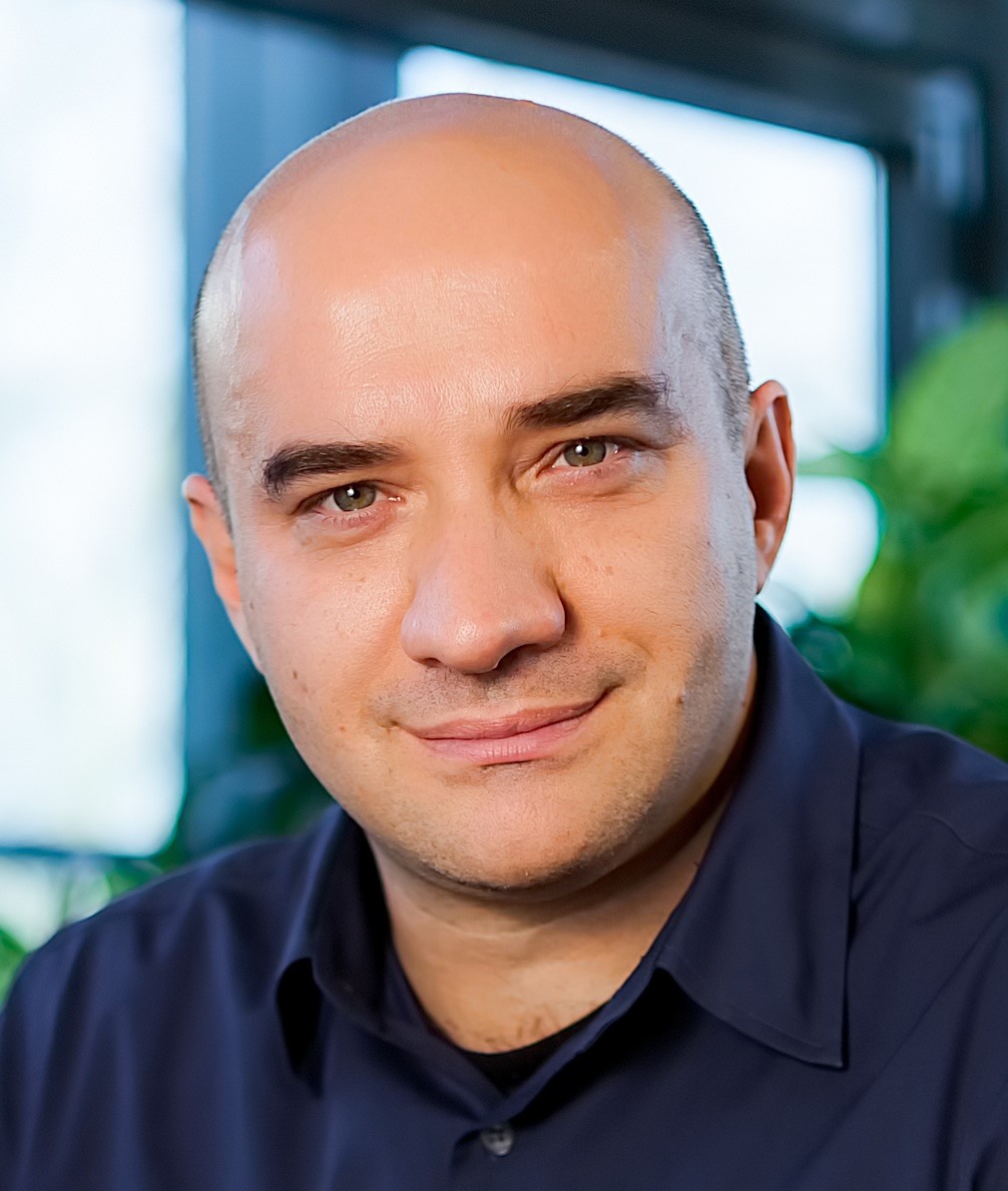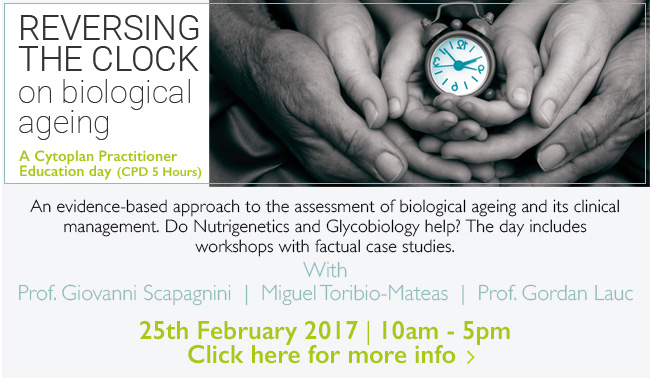In the first of a 3-part series preceding our event on “Reversing the clock on biological ageing”, clinical neuroscientist and functional nutrition practitioner Miguel Toribio-Mateas interviews Professor Gordan Lauc of the University of Zagreb, one of the world’s leading glycobiology scientists, and a speaker at our upcoming event in February.
During the interview, Professor Lauc discusses the complex field of glycobiology and why it is becoming one of the most promising scientific disciplines of the 21st century.
Professor Lauc will be speaking at our Practitioner Education Day in February. To find out more about this event, and to book your place, please click here.
Professor Gordan Lauc has been publishing in the field of glycobiology for over 20 years. His current interest is focused on the complex genetics of protein glycosylation and the role of alternative glycosylation in physiological and pathophysiological processes. Miguel begins the interview by asking him to explain in “plain English” what this means.
Prof. Lauc: Life on this planet developed on the basis of nucleic acids – DNA and RNA – as a database that keeps all information, and proteins that act as molecular effectors that perform the majority of structural and functional roles in all cells.
However, once life became multi-cellular and gained on complexity, the limited number of proteins (approx. 100,000) was not enough to perform the increased number of necessary functions. To cope with this, evolution developed different post-translational modifications, which are effectively different add-ons to proteins that enrich their structure and function. Glycosylation is the most complex post-translational modification, which adds over 2,000 different glycan (sugar) blocks to proteins.
This results in the total set of glycoproteins that is several orders of magnitude larger than the total number of proteins. Glycobiology is recently emerging at the frontier of biomedical research as a scientific discipline that studies structure and function of these molecules. The growing knowledge on the importance of glycans for understanding of the molecular basics of all biological processes has caused great advances in this field in the last decade.
Miguel T-M: Practitioners will be aware of some functions of glycosylated proteins, e.g. haemoglobin. Could you explain what glycans are and what do they do?
Prof. Lauc: Glycans are complex oligosaccharides (sugars) attached to proteins and lipids as their structural and functional parts. Therefore, they contribute to all aspects of life. Their main peculiarity is that they are not hardwired in genes, so contrary to proteins that will have the same structure for our entire life, glycans change with time and we can even change them with our lifestyle decisions.
The composition of glycans attached to a certain glycoprotein is a result of a dynamic interaction between genetic and environmental factors, i.e. between what we inherit from our parents (and is therefore out of our control) and what we do with our body and what our lifestyle is like (which is, in great part, under our control).

Image reproduced with permission from J Inflamm Res. 2016; 9: 209–219.
Miguel T-M: So why are glycans important biomarkers in age-related conditions?
Dr Lauc: Extensive studies on over 40,000 individuals identified glycans as the best biomarkers of chronological and biological ages. For example by analysing only glycans attached to immunoglobulin G, it is possible to predict a person’s chronological age with a mean error of 9 years. But even more importantly, the difference between “glycan age” and chronological age associates with diseases and biomarkers of unhealthy lifestyle.
Miguel T-M: Does this mean that glycans can be used for disease prevention and treatment?
Prof. Lauc: Indeed. The key advantage of glycans is that they start to change before our unhealthy lifestyle materialises in a specific disease. Therefore, they can be used as an early warning signal that our health is deteriorating and that we should start to pay more attention it.
Miguel T-M: I see, so knowing your glycan age can help motivate an individual to make changes to their lifestyle that are conducive to better health outcomes. Could you give us some more specific examples of how measuring glycans can help with specific conditions?
Prof. Lauc: We have extensive and very strong evidence that accelerated glycan ageing is associated with unhealthy lifestyle and disease, while health and known markers of good health (like low BMI, blood pressure, insulin, etc.) associate with decreased glycan age. Therefore, we assume that lifestyle decisions affect glycan age, but studies that are measuring glycan age longitudinally in individuals undergoing lifestyle change are still very limited, thus we do not know how much this is predetermined by genes and how much it is affected by lifestyle, and this includes dietary changes along the lines of those promoted by functional nutrition practitioners.
Therefore, we have initiated a large research project in collaboration with the British Association for Applied Nutrition and Nutritional Therapy (BANT) as part of which we will be collecting blood samples from 1,000 individuals that commit to undergoing a significant lifestyle change that includes following the advice of a nutritional therapy / functional dietetics practitioner, to see to which extent and how fast our lifestyle decisions can change our glycan age.
All members of BANT who’d like to participate in this research project should register their interest today. This is a great opportunity to be involved in groundbreaking ageing research.
If you are a BANT member and would like to register as a research partner, please follow this link.
Miguel T-M: What are your views on fructose glycosylation specifically and its effects on ageing, compared with that of glucose?
Prof. Lauc: It is very important to make the distinction between glycans as structural elements of proteins, and carbohydrates as dietary components. Although there is plenty of evidence that a high-fructose diet is very unhealthy, this is a completely different thing that should not be mixed with glycans.
Miguel T-M: Are there any key papers you could refer our readers to? I’d be really grateful if you could provide us your top 3 papers to read before coming to your talk.
Prof. Lauc: There are three excellent introductory texts about glycans, which are publicly available and would be an excellent background reading.
- Lauc, G., Krištić and Zoldoš¡, V. (2016) Glycans – the third revolution in evolution. Available here.
- European Science Foundation (2015) A Roadmap For Glycoscience in Europe. Available here.
- National Academy of Sciences (2012) Transforming Glycoscience: A Roadmap for the Future. Available here.
A concluding statement from Miguel Toribio-Mateas
According to Prof. Lauc, glycobiology is definitively one of the most promising scientific disciplines of the 21st century. Until recently it was hampered by the absence of adequate tools to study glycans, but this has now changed and it is time for glycobiology to take its rightful place among other prominent scientific disciplines.
As a member of BANT, it is very exciting to have been chosen to be a research partner for Prof. Lauc’s study to assess the impact of dietary interventions on glycan age. I am looking forward to future collaborations that contribute to establishing the evidence base that enable more nutrition practitioners to use glycan analysis for the benefit of human health. I am really looking forward to his talk on 25th February and hope to see many familiar faces at the event.
Miguel Toribio-Mateas
 Miguel is a nutrition practitioner, author and researcher with extensive knowledge and expertise in functional medicine and ageing science. Miguel completed a MSc in Clinical Neuroscience at Roehampton University in 2016 and was awarded a scholarship for multidisciplinary doctoral research in brain ageing and cognitive decline by Santander Bank, assessing the clinical application of the Bredesen Protocol under the auspices of the Institute for Work Based Learning at Middlesex University.
Miguel is a nutrition practitioner, author and researcher with extensive knowledge and expertise in functional medicine and ageing science. Miguel completed a MSc in Clinical Neuroscience at Roehampton University in 2016 and was awarded a scholarship for multidisciplinary doctoral research in brain ageing and cognitive decline by Santander Bank, assessing the clinical application of the Bredesen Protocol under the auspices of the Institute for Work Based Learning at Middlesex University.
Professor Gordan Lauc
 Professor Lauc has been publishing in the field of glycobiology for over 20 years and his current interest is focused on the complex genetics of protein glycosylation, and the role of alternative glycosylation in physiological and pathophysiological processes.
Professor Lauc has been publishing in the field of glycobiology for over 20 years and his current interest is focused on the complex genetics of protein glycosylation, and the role of alternative glycosylation in physiological and pathophysiological processes.


After each of the 2 keynote lectures, the session will turn into a workshop facilitated by Miguel. To find out more about this event and to book your place, please follow this link.
With many thanks to Miguel for this Q & A session, if you have any questions regarding the health topics that have been raised please don’t hesitate to get in touch with me (Amanda) via phone; 01684 310099 or e-mail (amanda@cytoplan.co.uk).
Amanda Williams and the Cytoplan Editorial Team: Miguel Toribio-Mateas and Joseph Forsyth.
Last updated on 8th December 2016 by cytoffice


We’d love your comments on this article
It’s easy, just post your questions, comments or feedback below